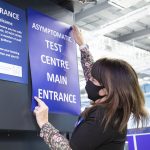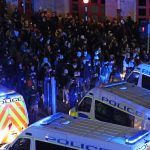A report into the violence at the Euro 2020 final at Wembley has concluded 2,000 ticketless fans stormed the stadium, creating a situation where people could have been killed.
The FA have apologised for the “terrible experience” many supporters endured on what should have been one of the greatest nights in the history of English football.
Dame Louise Casey’s review found that there was a “perfect storm of lawlessness” at Wembley, which put the lives of fans at risk.
It was created, she concluded, by “a horde of 6,000 or more ticketless fans, many of whom were no more than mindless thugs.”
The warning signs were there for the authorities, given the Euro 2020 final was the biggest fixture in England since the 1966 World Cup final, and it was taking place after COVID-19 lockdown restrictions had been relaxed.
However, the authorities failed to adequately prepare or anticipate the extent of the trouble, the report said.
“Shocking and unprecedented levels of criminal and anti-social behaviour were evident from very early in the day, which caught all agencies off guard and meant the police deployment arrived too late,” it states.
Cheshire man sentenced for racist abuse of England players Marcus Rashford, Jadon Sancho and Bukayo Saka after Euro 2020 final
Ex-England captain Rio Ferdinand to share experiences of online racism with MPs and peers
Euro 2020: Teenage steward stole items from Wembley to let ticketless fans into final
Crowd safety expert Eric Stuart analysed the trouble and identified “many instances before, and during, the match, where the behaviour of ticketless fans created risks of progressive crowd collapse on staircases, door wedging, trampling in crowds, barrier collapse and entrapment”.
“Some of the riskiest moments by ticketless fans were when large numbers of people were compressed as they surged through fire doors deliberately opened from the inside by fans,” he concluded.
The review said it found “no evidence to contradict Mr Stuart’s central conclusion: that the events of 11 July at Wembley Stadium saw a series of ‘near misses’ which could have led to significant injuries or even death”.
While 2,000 people forced their way into the stadium, with around 400 ejected by staff, the report says: “In all, 17 mass breaches of Wembley’s gates occurred during a period stretching from 90 minutes before kick-off until the penalty shootout.”
So overwhelmed were stewards and the limited police numbers, that one Wembley security manager told the review: “I’m not sure ten more police units would have worked.”
The review heard from thousands of fans who attended the game, who provided harrowing accounts of what happened.
One wrote: “People were taking cocaine in front of us and smoking drugs behind us. My sons cried for most of the game, scared by the events surrounding us.”
It also reveals that around 6,000 people were outside looking to storm the stadium at the end of the game had England won the penalty shoot-out against Italy.
Baroness Casey said: “Safety has been the dominant issue and my principal concern. The events at Hillsborough in 1989 have weighed heavily on my mind.”
The circumstances were distinctly different at Wembley, according to the review, but the fact nobody lost their life should be considered fortunate.
FA CEO Mark Bullingham welcomed the report and said: “The FA apologises for the terrible experience that many suffered within Wembley on what should have been a historic night for the game.
“Everyone at The FA was appalled at the significant levels of crowd disorder throughout the day on 11 July. The Review makes clear that the circumstances leading up to the match led to a perfect storm of lawlessness.
“No event is set up to deal with such disgraceful behaviour from thousands of ticketless fans. Collectively we must never allow this to happen again.”
Please use Chrome browser for a more accessible video player
The FA agreed with Baroness Casey that all organisations involved needed to view events of such national significance “through a different lens” and work to ensure international events at Wembley never fail to anticipate what could happen.
Baroness Casey said: “A national effort that truly kicks out racism and hooliganism from football and society at large would be a fitting tribute to that England team, and all those of us who love our national game and our country for the right reasons.”






















